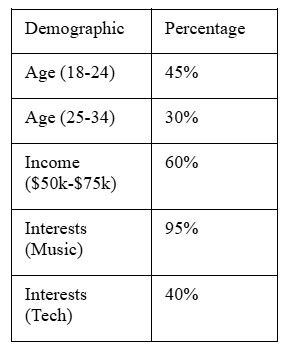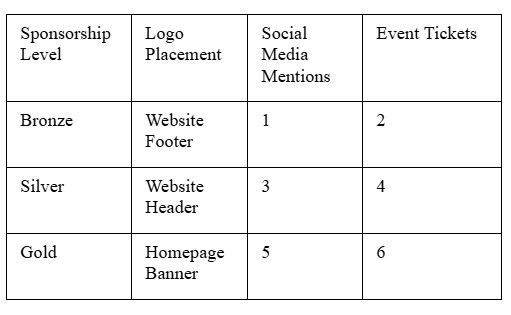Register as an organizer
Click the button below and finish your organizer registration, or fill out the form and we will be in touch to assist you.

Getting sponsors for your concert can really make a difference, helping cover costs and making the event even better for everyone. But it's not just about asking; you've got to show companies why partnering with you is a smart move for them. This means understanding what they need, putting together a pitch that highlights the good stuff they'll get, and making sure your sponsorship deals are clear and appealing. Let's break down how to make these partnerships work.
Before you even think about asking for money, you need to really get to know who you're asking. It’s not just about finding any company, it’s about finding the right company. Think of it like dating, you wouldn't ask just anyone to marry you, right? You want someone who gets you, who shares your values, and who can actually contribute to your life. The same goes for sponsors.
Companies sponsor events for a bunch of reasons, and it's not always just about charity. They're businesses, after all, and they want to see some kind of return. Are they trying to get their name out there to a new group of people? Maybe they want to generate leads, or perhaps they're looking to boost their image with a specific crowd. You need to figure out what keeps them up at night. What problems are they trying to solve? If you can show them how sponsoring your concert helps them tackle one of their challenges, you're already way ahead of the game. Don't just guess; do your homework. Look at their recent marketing campaigns, read their press releases, and see what they've been talking about lately. This intel is gold.
Sending your proposal to the general info@ email address is usually a waste of time. You need to find the person who actually has the power to say 'yes'. This might be the marketing manager, the community relations director, or even the CEO in smaller companies. LinkedIn is your best friend here. Search for people who work at the companies you're targeting and look at their job titles. Sometimes, a quick call to the company's main line can get you the right contact person's name. Knowing who to talk to makes all the difference.
It's also important to be realistic about what you can ask for. Does the company have a history of sponsoring events like yours? What's their typical sponsorship level? You don't want to aim too high and get a flat no, but you also don't want to undersell yourself. Try to find out what their marketing budget might look like, or at least get a sense of their financial capacity. If they're a small local shop, they probably can't afford to sponsor a massive stadium tour, but they might be thrilled to sponsor a local band's gig. It’s all about finding that sweet spot where your event fits their budget and their goals.


So, you've done your homework and know who you want to talk to. Now comes the part where you actually convince them to open their wallets. This isn't about just asking for money, it's about showing them why partnering with your concert makes sense for their business. Think of it like this, you're not selling a sponsorship, you're selling a solution to a problem they might not even know they have yet.
Nobody wants to throw money into a black hole. Sponsors need to see what they're getting out of the deal, and more importantly, how it helps them make or save money. Forget vague promises about 'brand awareness.' Get specific.
The goal is to translate your concert's success into their company's success.
You need to present numbers that show them a return on their investment. If they spend $10,000 with you, you need to show them how they can realistically get $15,000 or more back in value, whether that's through new customers, increased sales, or other measurable outcomes.
This is where that initial research really pays off. A tech company might care more about reaching a younger, tech savvy crowd, while a local brewery will be all about brand visibility within the community. You can't use a one size fits all approach.
When you talk to them, use their language. If they're talking about expanding into a new market, explain how your concert audience represents that market. If they're focused on sustainability, talk about any eco-friendly aspects of your event.
This is your chance to paint a picture of who's coming to your concert. Don't just say 'young people.' Give them the nitty-gritty details.
Here’s a sample of what you might include:

Beyond just numbers, talk about how your audience interacts with the event. Are they active on social media during the concert? Do they participate in interactive elements? Showing that your attendees are engaged and responsive makes them much more attractive to sponsors looking for an active audience, not just a passive one.
When you're trying to get companies to sponsor your concert, you can't just throw a bunch of random perks together and hope for the best. You really need to think about what makes a package attractive to them. It's like putting together a really good menu, you want variety, clear descriptions, and something for everyone, right?
Think about what makes your concert stand out. Is it the genre of music, the venue, or maybe the specific audience you draw? You want to offer sponsors chances to connect with your fans in ways that are special to your event. Maybe a sponsor could get their name on a specific stage, or perhaps they could host a meet and greet with one of the performers. The goal is to offer something they can't easily get anywhere else. It’s not just about slapping a logo on a banner; it’s about creating memorable interactions.
Most sponsors have different budgets and goals. So, offering a few different levels of sponsorship is a smart move. You could have a basic package with just logo placement, a mid-tier one that includes some social media shout outs, and a top tier package with more involved opportunities like a dedicated activation space or a speaking slot. It’s also a good idea to be open to tweaking these packages. A sponsor might have a specific marketing campaign they want to tie into your event, and being flexible can make a big difference. It shows you’re willing to work with them to make the partnership a success.
Here’s a simple way to think about different levels:
This is super important. Sponsors need to know exactly what they’re getting for their money. Don’t make them guess. List out every single benefit clearly. If a package includes social media posts, specify how many and when they’ll go out. If it’s a booth, describe the size and location. Also, be clear about what you need from them. Do they need to provide marketing materials by a certain date? Do they need to send a representative for a speaking slot? Laying all this out upfront avoids confusion and builds trust. It makes the whole process feel more professional and less like a gamble for the sponsor.
When you present your sponsorship packages, imagine you're the sponsor. What questions would you have? What would make you feel confident signing on the dotted line? Think about clarity, value, and how the partnership aligns with your own business objectives. Making it easy for them to say 'yes' is key.
When you're trying to get a company to sponsor your concert, just saying you'll have a lot of people there isn't enough anymore. You really need to show them numbers and facts. Think about it: if you can prove that your concert attendees are exactly the kind of people a sponsor wants to reach, that's a much stronger case than just guessing. It's all about making your pitch concrete.
Companies that have sponsored you before and had good results? Get their stories! Ask them if they'd be willing to share what worked well. This could be anything from how many people visited their booth to how many leads they got. A simple quote or a short case study from a happy sponsor can be super convincing. It shows potential new sponsors that you're not just making promises; you've actually helped others succeed.
This is where you bring out the spreadsheets and analytics. What's your concert's social media reach? How many people are on your email list? What's the average age and interest of your typical attendee? Presenting this kind of data clearly shows the sponsor the real value they're getting. For example, you could show:
1. Audience Demographics:
2. Reach & Engagement:
Don't just dump raw data. Explain what it means for the sponsor. Connect your audience's interests directly to their products or services. Make it easy for them to see how sponsoring your event helps them connect with their target customers.
Beyond just showing who comes to your concert, think about how you can help sponsors get new customers. Can you offer them a way to collect email addresses? Maybe a contest or a giveaway at their sponsored booth? If your concert has a strong online presence before and after the event, that's more reach for the sponsor. Mentioning how many people might see their logo on your website, social media posts, or even in pre-event advertising can really boost your pitch. It's about showing them not just visibility, but actual opportunities to grow their business.
Securing a sponsor for one event is great, but getting them to come back year after year? That's the real win. Building lasting relationships with your sponsors means treating them like partners, not just a line item in your budget. It’s about making them feel seen and valued, which, honestly, isn't that hard to do if you put in a little effort.
First things first, you need to talk. Like, really talk. Before the event even kicks off, sit down (virtually or in person) and figure out what success looks like for both of you. What are their main goals for sponsoring? Is it brand awareness, lead generation, or something else entirely? Clearly defining these objectives upfront prevents misunderstandings down the road. It’s like planning a road trip; you both need to agree on the destination before you start driving.
When you take the time to understand what truly drives your sponsor's business, you can tailor your event's opportunities to meet those specific needs. This mutual understanding is the bedrock of a strong, ongoing partnership.
Don't just stick their logo on a banner and call it a day. Think about how you can work with your sponsors to create content that benefits everyone. Maybe they can host a webinar with you, contribute a guest blog post, or even have a featured Q&A session during the event. This kind of collaboration gives them more exposure and provides your audience with interesting content. It shows you're invested in their success, not just their check. For example, you could offer a sponsor the chance to co-create content for your social media channels, giving them direct access to your audience.
From the moment they sign on to the post event follow up, make the sponsor's journey as smooth as possible. This means clear instructions, timely responses to their questions, and making sure all the promised benefits are delivered. If they have a dedicated contact person who can handle their needs, that’s even better. Think about it, if their experience is positive and hassle free, they’re much more likely to sign up again. A disorganized or difficult experience, on the other hand, can sour even the best intentions. You want them to look forward to working with you, not dread it.

Sometimes, limiting who can sponsor your concert can actually make the opportunity more appealing. It’s a bit like a limited-edition item, people want it more because not everyone can have it. This approach helps you focus on the best fits for your event, rather than just taking any offer that comes along.
Think about it: if you offer a sponsorship package that’s available to everyone, it might not seem as special. But if you say, "We only have three of these premium spots available," suddenly, it feels more exclusive. This scarcity can drive demand. Sponsors might feel more pressure to commit quickly to secure one of these limited opportunities. It also signals that you’re selective about who you partner with, which can make your event seem more prestigious. This can lead to sponsors being willing to pay more because they see the value in being one of the few chosen.
Another way to play the exclusivity card is by making certain packages invite only. Instead of letting companies apply, you handpick a few select businesses that you think would be a great match. This makes the sponsorship feel like an honor, not just a transaction. It’s a way to build stronger relationships from the start, as the sponsor feels recognized and valued. This can be particularly effective for high value packages where you want a very specific type of partner.
It’s tempting to want to fill every sponsorship slot, but focusing on quality over quantity can pay off big time. When you’re selective, you attract sponsors who are genuinely aligned with your concert’s vibe and audience. This means they’re more likely to invest fully and get better results, which in turn makes them happy. Happy sponsors are more likely to return for future events. It’s better to have a few really engaged sponsors who get great exposure than a lot of sponsors who are just passively present. This focus on quality helps build a reputation for successful partnerships.
Your event website is often the first place a potential sponsor looks to get a feel for your event and what you offer. Making it look good and easy to use is a big deal. Think of it as your digital handshake, you want it to be firm and friendly.
This page needs to be more than just a list of benefits. It should tell a story about your event and why a sponsor would want to be a part of it. Use good photos or even short videos from past events to show the energy and the people who attend. Clearly state what makes your event special and who your audience is. If you have different levels of sponsorship, like bronze, silver, and gold, lay them out clearly. A table can work well here to compare what each level includes.

People like to see who else is involved. Showcasing logos of companies that have sponsored you before builds credibility. It tells new sponsors, "Hey, these other businesses found value here, and you will too." Mentioning key features of your event, like popular speakers, unique activities, or the overall vibe, also helps paint a picture. If you have data on attendee engagement or demographics, like age ranges or interests, include that too. This helps sponsors see if your audience matches their target customers.
Don't make sponsors hunt for how to get in touch. Have a dedicated contact person or email address clearly visible. Use phrases like "Interested in Sponsoring? Contact us here" or "Download Our Sponsorship Prospectus." Make it easy for them to take the next step, whether that's filling out a form, sending an email, or downloading more detailed information. A clear call to action guides them directly to what you want them to do.
So, we've gone over how to find the right companies to partner with, how to put together a pitch that really shows them what's in it for them, and how to make sure they feel good about their investment. It’s not just about getting a check; it’s about building a connection. Remember to do your homework on potential sponsors, clearly explain the good stuff they'll get, and always follow up. By focusing on making it a win-win situation, you’ll not only secure sponsorships for your next concert but also build relationships that can last for years to come. Good luck out there!
Think about what a company wants to achieve. Does it want more people to know about its products? Does it want to connect with specific types of customers? Understanding these goals helps you show them how sponsoring your concert can help them reach those goals.
You need to show them what they'll get in return for their money. This could be how many people will see their name or logo, how many new customers they might get, or how their brand will be shown off at the concert. It's like saying, 'Sponsor us, and this is what you'll gain.'
It's smart to create different sponsorship options at different prices. Some sponsors might want a lot of attention and be willing to pay more, while others might want less. Offering choices helps more companies find a sponsorship level that works for them.
Yes, definitely! Use information from past concerts. Show how many people came, who they were (like their age or interests), and how much sponsors liked working with you before. This proves your event is a good place for their brand.
It's important to keep sponsors happy after they agree to help. Talk to them regularly, share updates, and make sure they have a good experience at the concert. If they have a great time, they might want to sponsor your next event too!
Create a special page on your event's website just for sponsors. Make it look exciting! Show logos of companies that sponsored you before and explain why sponsoring your concert is a great idea. Make it easy for them to contact you.
More blogs
Click the button below and finish your organizer registration, or fill out the form and we will be in touch to assist you.